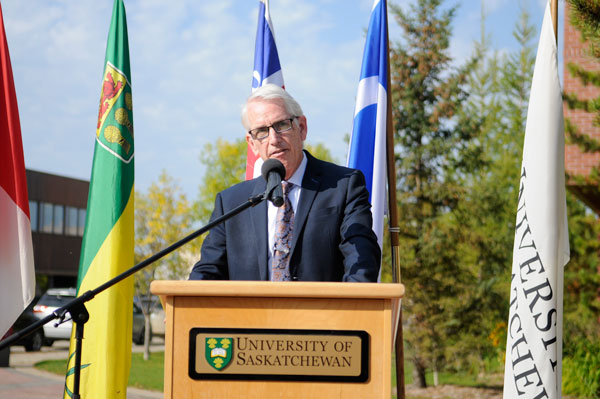
Planning, leadership, and international rankings were all on the agenda as members of the University of Saskatchewan met at the USask Prince Albert campus for the first of a three-day Senior Leaders’ Summit.
The meeting began in Prince Albert on Tuesday morning, and included all senior leadership such as deans, vice-presidents, and associate vice-presidents. USask President Peter Stoicheff said they wanted to hold the meeting outside Saskatoon to help remind everyone they serve the entire province.
“We try to climb as high as we can and look as far into the future as we can in terms of what our priorities should be and where we think we’re going,” Stoicheff said.
“I thought that it would be a great idea for us to spend the first part of our meeting at the campus in the building … as we went up to Waskesiu instead of just driving by it because it’s really important for us.”
The University of Saskatchewan currently sits 358th out of more than 2,500 universities reviewed in the 2023 Academic Ranking of World Universities. Stoicheff said they’ll be looking at ways to boost the quality of education students receive in hopes of boosting their ranking. They’ll also look at ways to improve as a research university, and discuss the development of acadmic programs to make students more employable after the graduate.
Student mental health was also on the agenda, something Stoicheff said is very important. The university’s financial sustainability was also up for discussion.
“That doesn’t just happen by chance,” Stoicheff said. “We have to be very careful about that, so we talk about our financial strengths and opportunities as well.”
The annual USask Senior Leaders’ retreat is typically held over three days in Waskesiu. Stoicheff said they wanted to stop in Prince Albert to take in the new campus, because it’s a good reminder that USask students come from across Saskatchewan.
“I like to remind people that we’re not the University of Saskatoon,” Stoicheff said. “We are the university named after the province. We have a responsibility to try to improve and ensure access for people who live far beyond the Saskatoon area.
“There is a University of Regina. It’s a very good university, and although we do a lot of things in Regina—medicine in particular—we have a focus on the North. Prince Albert seemed to be a logical place for us to have a campus that could help people come to university,” he added.
Stoicheff was an advocate for opening a Prince Albert campus beginning when he became president eight years ago after previously serving as Dean of the College of Arts and Science.
Serving as Dean brought him to Prince Albert a lot because the university ran so many programs and classes up north.
“When I became president, we had a luncheon in P.A. and I said to everybody, ‘Prince Albert is really important for us,’” Stoicheff remembered. “’We have a bit of a presence here, but it’s scattered across different locations and we should be creating a single sort of campus where students, regardless of what program they’re in, would be coming and they’d get all kinds of things that students who come to a campus should be getting.’”
That initial talk led to the university eventually purchasing the current campus in downtown Prince Albert. Stoicheff said it’s important to have a senior leadership presense in the City too along with the campus.
“I just want to emphasize how important it is for us to be in Prince Albert,” he said. “I don’t say that lightly. We feel that by being here we can provide potentially access to far more students than if we just remained exclusively in Saskatoon.
“We feel that a large percentage of those students—and a larger percentage than in Saskatoon—will be and are self-declared Indigenous. That’s important for us, ensuring that we are broadening our position in the North. A lot of the research that we do has to do with northern geology, northern biology Indigenous peoples and their communities.
“I’m proud of the fact that we have so much support from here,” he added. “We have hundreds of alumni here. I know the mayor was (here) when we started this journey and continues to be supportive as the city council, and local MLAs. It’s significant for us to be here, and that’s why I wanted this summit to start here.”
The summit included a keynote address from Lisa Thomidas, head coach of Huskies women’s basketball and former head coach of the women’s national basketball team.

